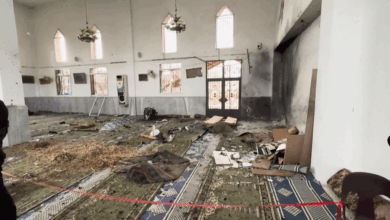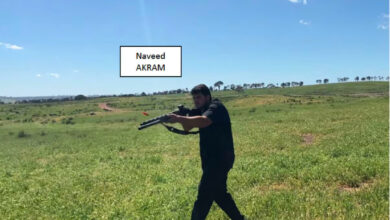
A few days after the terrorist attack against Karm al-Qaradees security ambush on 24 October, Mohamed Halawa received notification by the army to evacuate his house located in Rafah city within 24 hours. He tried to transfer what he could on a truck.
“I have been living here since the 1973 war. I built the house on the lands of my grandfathers. Of course, none of us used to pay for rent or be kicked out,” Halawa said, adding that he does not know where he and his family should go amid all the destruction at Rafah border. The problem is that there wasn’t any chance to negotiate or discuss the housing issue, he said adding that no alternatives for housing or transferring the furniture were available before evacuating the house.
Having the furniture transferred, the six-member family stood before the house. One of the daughters said, “We are very sad for what happened. We feel broken for leaving the house where we were born, only to see to destroyed.”
The wife did not hide her resentment about the short period granted by police and military for the residents to find alternative houses. “The government or the armed forces should have provided us with alternative houses before the displacement and destruction of the houses, or at least the North Sinai governorate should have provided housing units, or a decision should have been made over reasonable rents in order not to leave it for the supply and demand,” she said.
Um Ahmed was one of Rafah residents who was forced to move to Arish. She lives with an extended family formed up of six smaller families. Each family consist of at least seven people. She said that she would always remember the bitterness of destroying her house before her eyes until she dies. “I never felt sad for anything like that when I saw my furniture thrown in the street waiting to agree with the truck driver to transfer it to Arish to start looking for alternative house,” said the grandmother adding that she, along with her family, had to stay at one of her neighbors houses, that was not evacuated, as she was not able to agree with the driver while her husband went to Arish in search for the new house.
On the first day, drivers asked for LE150 to transfer furniture from Rafah to Arish, while on the second day they demanded LE200, which then rose to LE300 on the third day. “That is, if you find a driver,” said Um Ahmed referring to the daily increase of displaced people in light of the few and expensive trucks.
Thinking about her family’s future in light of the new financial burden imposed on her husband who works as a teacher to pay for the rent, a displaced woman from Zaarab family said, “I have been living in my house for decades. It’s composed of five rooms. Today, the whole family stays in one room, while the men spend the day at work and return back quickly before the curfew.”
“The rent before the displacement process ranged between LE250-LE350 per month if the place was furnished. Now the empty house of area of 90-100 meters ranges between LE650-LE800, reaching up to LE1500 if it has beds only,” she added refusing accusations by media against rafah residents.
Edited translation from Al-Masry Al-Youm




